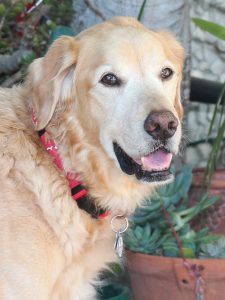Tuck and Trooper
Dedicated volunteer duo visited hundreds of patients together
 August 2018
August 2018
One of our most loyal Direct Care Volunteers was also one of the most intuitive. For the past several years, he connected with patients without speaking a word. Always sweet and quiet, sometimes he knew that all someone needed was a gentle paw of reassurance.
Trooper, a golden retriever and trained therapy dog, was the constant companion of Direct Care Volunteer Tuck Geerds. They visited hundreds of patients together, including veterans at the Palo Alto and Menlo Park VA and, since 2012, hospice patients.
Tuck had a long career in special education, which she says prepared her well to talk to people in all situations. “It was an advantage for me,” she says. “I learned how to communicate with people who don’t communicate in the ways we do. Some of our patients have had long conversations with Trooper.”
Tuck explains that they let the patient determine the nature of each visit. Sometimes they would walk the dog together, or the patient might throw a Frisbee. Some patients liked to groom him. “Anything that let them connect with Trooper,” Tuck says.
One of Tuck’s favorite ways to facilitate that connection was to read a special book she wrote about Trooper. Written in his voice and filled with photos, the book tells stories of his life from the day Tuck adopted him as a puppy in 2005.
The golden seemed to intuit what each person needed. “He knew where the area of concern was,” she says. He would sometimes just sit in front of a patient in a wheelchair, with his paws resting on the person’s feet.
 When Trooper was diagnosed with cancer in 2016, it barely slowed down his volunteer work. Tuck knew that it was important for both of them to keep up their volunteering, and she found it helpful to share Trooper’s prognosis with the patients they visited.
When Trooper was diagnosed with cancer in 2016, it barely slowed down his volunteer work. Tuck knew that it was important for both of them to keep up their volunteering, and she found it helpful to share Trooper’s prognosis with the patients they visited.
She also said she learned from her hospice patients how to care for her dog in his illness. “I didn’t push him,” she says. “I listened to him. If he didn’t want to do something, that’s ok. I took it on his time.”
After he stopped receiving treatment in fall 2017, Trooper’s fur thinned and he lost weight – but his tail kept wagging, and they continued their visits until the following March, when they said goodbye to their patients.
Trooper passed away in April 2018, just days after his 13th birthday, with Tuck by his side.
“There is no doubt that Trooper loved his work,” she says. “He made friends wherever he went, and I know he provided a lot of loving comfort.”
“It wasn’t work for him. He gave all the love.”
